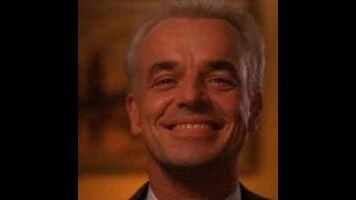"Episode 5"/"Episode 6"

Episode 5
A couple of posts back I suggested that the problem with Twin Peaks is that after the pilot and the whacked brilliance of the dream sequence that ends Episode 2 there’s nowhere to go but down. But after watching the fifth and sixth episodes of the first season again I realized I was wrong. Those first episodes are the TV equivalent of an overpowering infatuation. It’s episodes like these that lead to a sustained love. If memory serves, I know that love is going to get frustrating further down the line, but rewatching these hours filled me with nothing but affection and admiration for Twin Peaks. The plot keeps chugging forward, the characters get more complex, and the weirdness deepens without drawing down everything around it. These episodes confirm that it wasn’t just a fleeting phenomenon but an honest-to-goodness great show.
Episode 5 brings us a little further along in the Laura Palmer mystery and much further along in the Ben Horne-wants-to-burn-the-mill subplot. Hank puts on a friendly face to the outside world but we know he’s up to no good. We discover that Josie can smoke a cigarette to sinister effect and that she may not be what she seems either. (A side note: For an unrepentant smoker, Lynch almost never fails to make smoking serve as shorthand for some deeper sin.) It’s hardly the most important scene to the series in terms of plot, but there’s an exchange between James and Donna that’s pretty key to its themes. After James tells Donna about his mother’s alcoholism he says, “It’s the secrets people keep that destroy any chance they have of happiness and I don’t want us to be like that.” In the next episode, Cooper, always a force for good, tells Audrey he has no secrets. In Twin Peaks, if not the real world, it’s the ability to be forthright and true that keeps people on the side of the angels. (At times literally.)
But this isn’t a universe dominated by goodness and that fact necessitates a lot of sneaking around. There are two knockout sequences here. In one Audrey, slipping between the cracks of the Great Northern, spies on her father cheating and planning evil deeds, then joins an in-progress party where Leland has begun freaking out to “Pennsylvania 6-5000.” Others start to comically imitate his sad dance but when we see Audrey again she’s in tears. She may be the show’s least mature character but, for this instant at least, she knows the score and is undone by it.
In the other, Bobby has a talk with Dr. Jacoby, who chips through his protective meanness to find a scared kid. His confession makes it sound Laura drew him into the dark side of life, not the other way around. “She said people try to be good but they’re really sick and rotten, her most of all,” Bobby says. “And every time she tried to make the world a better place, something terrible came up inside her and pulled her back down into hell.” For all its endearing quirks, Twin Peaks is the kind of place where that sort of thing happens.
 Keep scrolling for more great stories.
Keep scrolling for more great stories.
